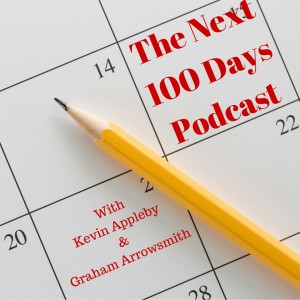
Content and Branding with Rebecca Bitton
Today we've got a talented content writer on the show. Graham met Rebecca through the same marketing training and she's on this episode to talk content and branding.
Having an expertise that you can teach can be anybody's secret source. A secret source is having something valuable to share so that people can apply it to their lives. You'll also help them reach their goals with your teaching. It's an amazing gift and privilege to do that. The results and progress in clients is something that really excites Rebecca to keep on working.
Content and branding: target clients
At this point, Rebecca's actually running two businesses. Her main job is teaching, especially with Covid shutting schools down as this means she can run a number of classes online.
The next portion of her business is content strategy. Her audience is primarily entrepreneurs, consultants, advisers, etc. A lot of them are big problem-solvers. Rebecca's job is to strategise content that targets their ideal client base and connect with them with engaging content that is valuable and educational.
What comes first when strategising content?
The thing that should come first is what are their (the client's) biggest problems right now? What can you help them with right now? Really listening and seeking to help their biggest needs helps establish that trust so that, when issues come up in the long term, they look for your help.
How do you get the material together (content) to approach those issues?
What Rebecca likes to do is 'the fly on the wall' strategy, which is to go wherever the client hangs out. Don't beat them but join them - get into their circles, where do they put their guard down? You want to be putting yourself into the environments where people are open and vulnerable in a genuine way. And it's all about having those listening skills and thinking about what everyone is truly worrying about.
As a result, you can respond to that. The content you should be generating is responsive to those issues and concerns. However, that's all dependant on the audience. You don't want to use the same strategy for each prospect since they're going to want different things - it will come across as disingenuous. Audience-centric content is key. That's how you build long-lasting relationships. Switch it up. Nobody wants a one-size-fits-all strategy. People want to feel unique.
http://thenext100days.org/wp-content/uploads/2020/05/Asking-for-marriage-on-the-first-date.mp4
English skills
Rebecca has studied and practiced as a writer for many years. Her first career was for a journalist, so story-telling has always been big thing for her. As was language.
The approach you take when writing content is so important. Think about how you talk to people in real life; you wouldn't go up to someone and give all your credentials would you? Because people are going to say "well, I don't know you so why would I care?" It's not a two-sided conversation. When writing content, it has to be two-sided; it has to be a conversation.
Terminology is also important. If you're talking to financial advisers, for example, you're not going to talk to them about woo-woo subjects such as energy and vibration and calmness. It's not their language. We all have different discourse languages but we need to be tapping into the language your audience knows and is familiar with. Language is a community-thing. That's why Google is so keen on SEO key words. Because, if you speak in the language that people care about, they will a) pick up your content and b) trust your content.
http://thenext100days.org/wp-content/uploads/2020/05/Jargon.mp4
http://thenext100days.org/wp-content/uploads/2020/05/Making-accounting-interesting.mp4
Is there an ideal length of a LinkedIn post?
It really depends on the objective of the article. And it also depends on the audience. If you want something that is sharable and is used to gain followers or e...
view more
More Episodes
#391 John Lamerton – The False Exit
 2023-09-15
2023-09-15
 2023-09-15
2023-09-15
#383 – Carole Asselin – Digital Scrapbooking
 2023-07-21
2023-07-21
 2023-07-21
2023-07-21
#382 John McClarey – Business Fives
 2023-07-14
2023-07-14
 2023-07-14
2023-07-14
#381 Graham Arrowsmith – Creating a Summit
 2023-07-07
2023-07-07
 2023-07-07
2023-07-07
012345678910111213141516171819
Create your
podcast in
minutes
- Full-featured podcast site
- Unlimited storage and bandwidth
- Comprehensive podcast stats
- Distribute to Apple Podcasts, Spotify, and more
- Make money with your podcast
It is Free
- Privacy Policy
- Cookie Policy
- Terms of Use
- Consent Preferences
- Copyright © 2015-2024 Podbean.com





